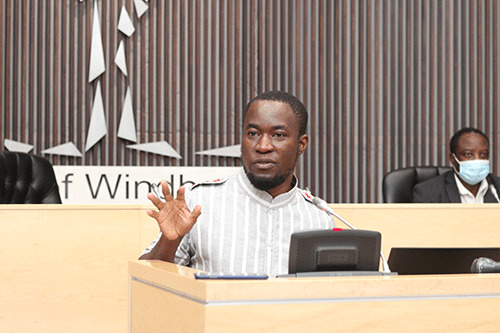Despite failing to satisfy requirements for a protective cost order, Affirmative Repositioning movement leader Job Amupanda has been asked to provide detailed information about his financial standing for the High Court to properly assess the matter.
This in a matter where Amupanda is fighting to remove the veterinary cordon fence, which is known as the red line.
Yesterday, High Court Judge Shafimana Ueitele said the suit instituted by Amupanda was of national interest and any person who has an arguable case that involves a matter of public interest must not, for fear of adverse cost order be deterred from pursuing such a claim in court.
“I am therefore inclined to assist Mr Amupanda in this regard. I will grant him leave to supplement his papers and place more detailed information before the court for the court to properly assess his financial resources and amount of costs that are likely to be involved in this matter,” said Ueitele.
Ueitele postponed the matter to 26 September for a status hearing.
Last year, Amupanda asked the court to protect him from legal costs, should he fail in his challenge to have the red line removed.
At the time, he said due to his limited financial resources, he would not be able to pay the legal fees of the respondents should he become unsuccessful with the suit. He anticipates the legal costs might run into millions.
According to the activist-cum-politician, since the matter involves public interest, he should not be punished for bringing such an important subject to the fore.
Amupanda argued that the opposing parties in the matter – the minister of Agriculture, Water and Land Reform, the government of the Republic of Namibia, the attorney general, an official from the Directorate of Veterinary Services Hango Nambinga and the Meat Board of Namibia – have amassed four instructed counsel in addition to two instructing firms.
Furthermore, he said, the respondents are not limited in terms of the legal fees they can pay to defend this application, compared to the applicant who relies on pro bono representation in addition to one instructed counsel.
He submitted there is no equality of arms, and that a protective cost order would not result in the sort of prejudice he would suffer if the orders were not granted.
According to Amupanda, the case has the potential of having far-reaching consequences as far as the public and national interests are concerned.
He said, according to Article 12 of the Namibian Constitution, matters of public interest must be resolved efficiently and as cost-effectively as possible, and ensure that all parties are on an equal footing.
However, the respondents were of the view that Amupanda is using the suit to collect political points.
They argue that public interest demands that the area south of the red line, which is free from Foot and Mouth Disease (FMD) without practising vaccination, be extended gradually to the communal areas north of the fence in a way that it does not cause Namibia to lose its status with the World Organisation for Animal Health (WOAH) as a country having areas that are free of foot and mouth disease.
As such, it would not be wise to abruptly remove the fence.
On the cost, the group argues that granting Amupanda immunity against cost will only encourage him to litigate wastefully. – mamakali@nepc.com.na



